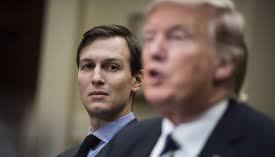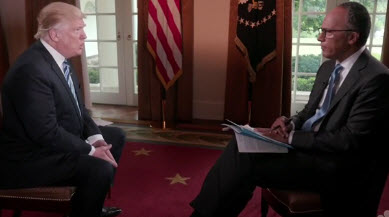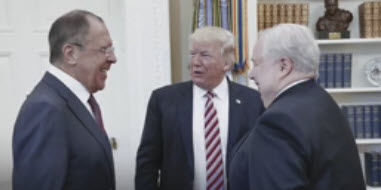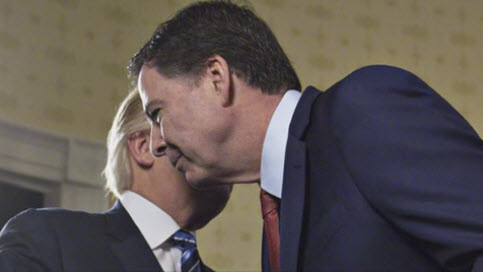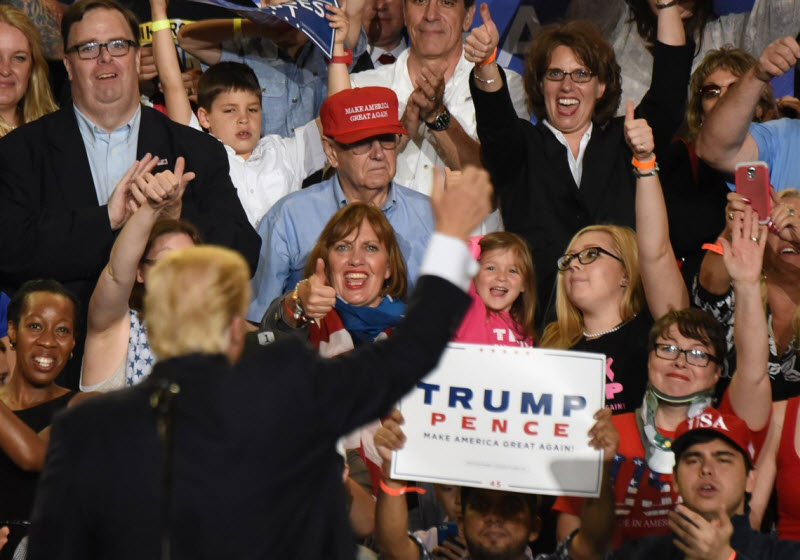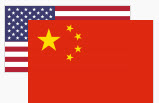Looks Like Healthcare Reform Is As Good As Dead
The media were bemused by the Rose Garden festival that took place after the House in early May passed the American Health Care Act by the slimmest of margins — 217 to 213 — referred to variously by its acronym AHCA as well as It’s a fair guess that President Trump wanted to make a big show to his following that he was keeping his promise to repeal and replace Obamacare because he might not get another chance. No one expects the Senate to pass the bill. Trump nevertheless exulted, “It’s going to be an incredible victory when we get it through the Senate”. Longtime Tennessee Republican Senator Lamar Alexander, chairman of the Senate health committee, said they would review the House bill, but only after its costs are assayed by the Congressional Budget Office — the House had skipped that step — and “Then we’ll go work on the Senate bill”, said Alexander. Senate aides let it be known that a Republican committee of 13 have been quietly working on a Senate bill of its own for months. what were they thinking?
Lacking votes, Paul Ryan withdrew the first attempt. In order to get the votes of the parsimonious Freedom Caucus, the second version took away still more benefits. Twenty Republicans voted against it, but the question is why so many Republicans voted for it. They know from fellow members who dared conduct town meetings during the Easter break how deeply unpopular the first take on “replace” was with voters; only 17% approved. The new House version can only raise the public ire higher. One conjecture says they fear being “primaried” in the 2018 election campaign by someone further to the right saying that “you had both houses of Congress but you couldn’t get it done”. Other than the ideological zealous, few come out to vote in the primaries, so the House Republicans had to show their ideological purity by cutting healthcare way back, and only then worry about changing their spots for the broader public as November 2018 approaches. Senators don’t have their problem. Their constituency is statewide; they don’t have to worry about tightly gerrymandered pockets of voters. And they enjoy six-year terms, staggered so that only a third of them are up for re-election next year. They aren’t driven by extremist demands so they are more likely to relax some of the austerity. The media has been full of details about the Republican plan. We’ll highlight below the most conspicuous stumbling blocks that seem sure to scuttle healthcare reform altogether. And, we’ll ask, then what? #1: the waivers
The Affordable Care Act’s (ACA, Obamacare) bans insurers from excluding benefits or charging sick people more for coverage. An amendment to the AHCA allows both, and that was enough to win over the Freedom Caucus, some three dozen House members who want healthcare stripped to the minimum. The provision allows any state to apply for waivers that permit them to opt out of several of mandates. The amendment became the flashpoint sparking the most outrage against the AHCA. To make for lower cost plans, the amendment would allow a peel away its choice of coverage items from the Affordable Care Act’s 10 “essential health benefits”. [2] That could include contraceptives, say, or maternity care or even cancer treatment. States might be free to reinstate the lifetime coverage limits that were banned by the Affordable Care Act. You don’t have to worry about that if you are in an employer-paid plan, right? Sorry to ruin your day, but the Affordable Care Act says that any insurer in any state has the right to adopt any coverage plan that has been approved in any other state. [1] So if a plan in Mississippi restores lifetime limits, employee insurers and their corporate clients in New York might be eager to copy that plan as a way to save considerable money. If that loophole is widely exploited, it could affect an unpredictable number of the 159 million Americans enjoying employer-sponsored coverage. The President complained that the media is “so unfair” because “they say we don’t cover pre-existing conditions — we cover it [sic] beautifully”. Perhaps unknown to him (neither had many Congress members read the bill) , the AHCA permits states to obtain waivers that allow them to charge higher premiums — potentially unaffordable premiums — based on the “health status” of a person with a gap in coverage who now applies for insurance. The list of pre-existing conditions is long; before Obamacare, some insurers counted as disqualifying conditions maladies as slight as acne in their quest to find as customers the least likely to cost them. To qualify for a waiver to charge more for persons with pre-existing conditions and to keep premiums low for others, the bill says a state must create some accommodation such as a “pool” into which to assign the costlier patients. The ultimate Act would then help fund the pool. It allocates $138 billion across 10 years. The Kaiser foundation says that’s not enough by far. It estimates that $250 billion would be needed. Effectively, the AHCA would be dangling extra funds to entice states to offer their people worse healthcare. It is the conservatives’ obsession with states’ rights that led to the waivers, but it is a provision that could lead to a disordered country with 50 different levels of healthcare, a country in which those with serious illness will find themselves having to move from one state to another to obtain lower cost coverage. #2: age discrimination
One serious defect in the Republican plan is sure to cause trouble. The rule that insurers may charge older people five times what they charge the youngest (vs. three times in Obamacare), but give them only twice as much dollars as the young to pay for it (and very little at that — $4,000 maximum), will lead to millions of persons unable to pay for insurance at precisely the ages when they begin to need healthcare the most. #3: medicaid cuts
The senators will also be hearing from governors in states that have taken advantage of the ACA’s expansion of Medicaid. It has been paying 100% of new enrollee costs, about to decline to a permanent 90%. The new House In 2020, Medicaid will begin paying a fixed amount per capita for those enrolled. No new applicant — new adults or families who fall below the poverty level — would be admitted to the federal rolls. Persons or families who lose Medicaid eligibility owing to rising incomes, but who then drop again below the poverty line, would not be allowed back in. Alternatively, a state will have the option of a lump sum payment — a “block grant” — to administer as they choose (with probably little oversight, inasmuch as there has been no mention of oversight provisions). Either way, it will be left to the states to pick up the tab for the rest, no matter the costs that regions and states are experiencing, no matter health care cost inflation. Hospitals that serve low-income patients “will just be drowning”, warns Michael Dowling, who heads a large health system in New York and calls the plan “a debacle”. The Center on Budget and Policy Priorities estimates that $370 billion in cost would be handed to the states over 10 years. The states won’t have the money. It’s a formula for the gradual extinction of federal involvement in Medicaid, as Republicans intend. that persnickety senate
The bill does not truly repeal or replace. Key to Republican strategy is a bill that that follows Senate rules for “reconciliation”, which blocks Democratic filibustering and allows passage with a simple 51 vote majority. The catch? For reconciliation passage, a bill must deal only with fiscal matters — taxes and spending and the like — and not with changes to the policies and structure of a law already on the books. So repeal under reconciliation leaves Obamacare’s structure in place. Further, the bill’s first hurdle will be the Parliamentarian of the Senate who will doubtless rule that the House has violated reconciliation’s rules. Several provisions of the bill the House passed are outside the chalk lines of reconciliation rules — those waivers allowing states to change other than financial matters — for example, the minimum insurance coverage standards that are baked into the Affordable Care Act. That means that, barring Republicans voting to change their own reconciliation rules (as they did to approve Gorsuch for the Supreme Court), the Parliamentarian must insist that waivers be removed from the Senate version. If the Senate is able to pass a bill, it will likely be substantially different from the House offering. The next step is for both bills to be handed to a joint Senate/House committee to work out differences. If they cannot come to agreement, the Republican reform of healthcare dies right there. If the committee succeeds, the homogenized result must then be passed by both chambers of Congress without so much as a comma changed. Did we mention that the waivers will have been removed? We are back to where the Freedom Caucus withheld its votes. Their ideological purity will mean that Trumpcare dies at least in the House. Obamacare will remain the law of the land. As it will continue to be It is difficult to see how a bill cobbled together with these stumbling blocks will surmount Democratic filibuster in the Senate — 60% will be needed to fully repeal or revamp anything structural in Obamacare — nor how a revised bill will win Freedom Caucus votes or if the obstacles are flattened removed and benefits are made more generous. Meanwhile, the Affordable Care Act continues for the several months that this process plays out. That is, if it can. The Trump administration has been back and forth about whether to cut off the funding that helps those with low income reduce their deductibles and co-payments, which would affect some seven million people. An appeals court has held off on a House of Representatives lawsuit that could ban all subsidies that help people buy insurance because Congress never authorized the money that both the Obama and Trump administrations have been paying out. Whether in reaction to the uncertainty caused by the political process, or whether from financial losses, the risk is that more insurers will drop out. Five states (Alabama, Alaska, Oklahoma, South Carolina, and Wyoming) are down to one insurer in their health exchanges, and twelve are down to two, with additional insurers threatening to join the Obamacare exodus. The President is eager to the see the ACA “explode” (or “implode”, depending on the tweet). Obamacare premiums are too high caused by a healthcare law that locks in (a) inflexibly high minimum coverage standards not tailored to age groups( those 45 to 65 don’t need maternity care) and (b) penalties for not buying insurance that are a bargain compared to those high premiums, and (c) the Republican-controlled Congress that for six years in the hopes that Obamacare would collapse has refused to consider fixing what isn’t working. The odds are strong that the Act will wither for lack of attention and its replacement will be stillborn. American healthcare will be a shambles. backlash
This outcome will not redound to the benefit of Republicans. An ABC News/Washington Post poll in April found that 7 in 10 Americans believe that all 50 states should be prohibited from charging higher rates to people with pe-existing conditions. A Kaiser Family Foundation poll, also in April, found that a significant majority of Americans believe that “President Trump and Republicans in Congress…are now responsible for any problems with the ACA going forward”. As for the 2018 elections, “You have every provision of this bill tattooed on your forehead”, warned Minority Leader Nancy Pelosi on the floor of the House just before the vote. “You will glow in the dark on this one”.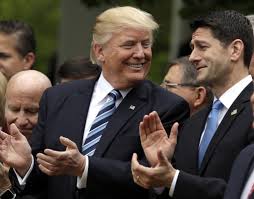
President Trump and House Speaker Ryan
celebrate partial
passage of healthcare bill
in the White House Rose Garden
Trumpcare. The media could not remember there ever being a celebration of a bill after it had cleared only one of the houses of Congress.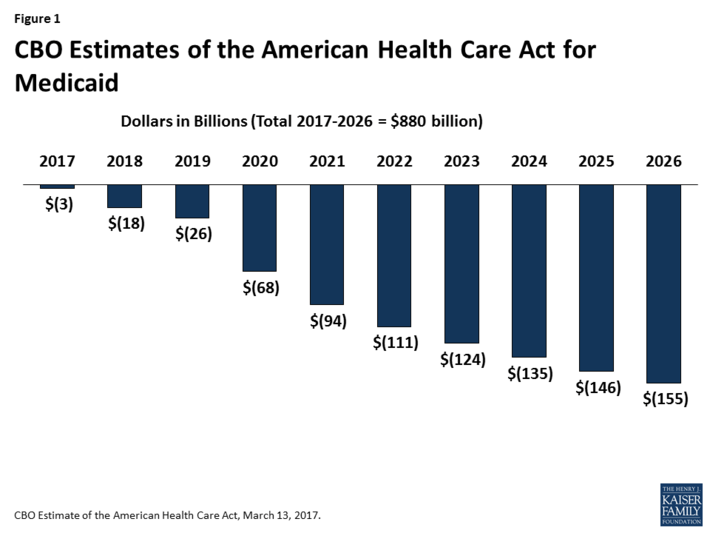
The Congressional Budget Office estimate of increasing
Medicaid cuts totaling $880 billion by 10 years out.
bill, in sharp contrast, would have states paying for 50% of the expansion rolls by 2020, and would then entirely change what has been an open-ended entitlement in which the federal government has for its decades provided matching funds to states for medical assistance to however many residents meet eligibility requirements.


